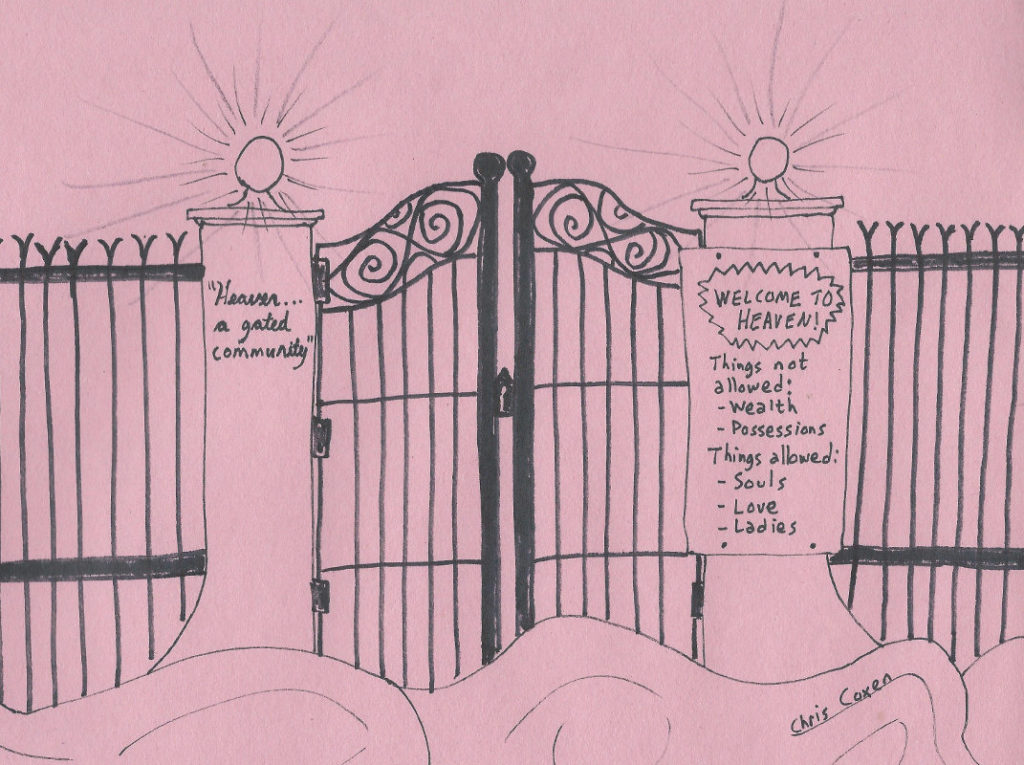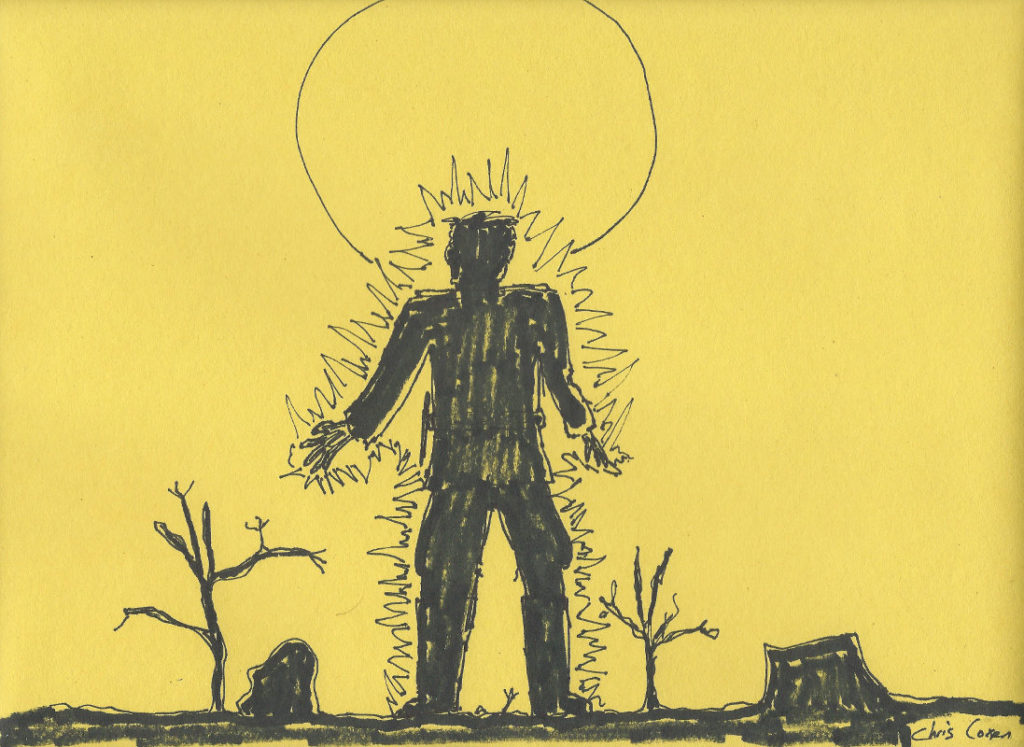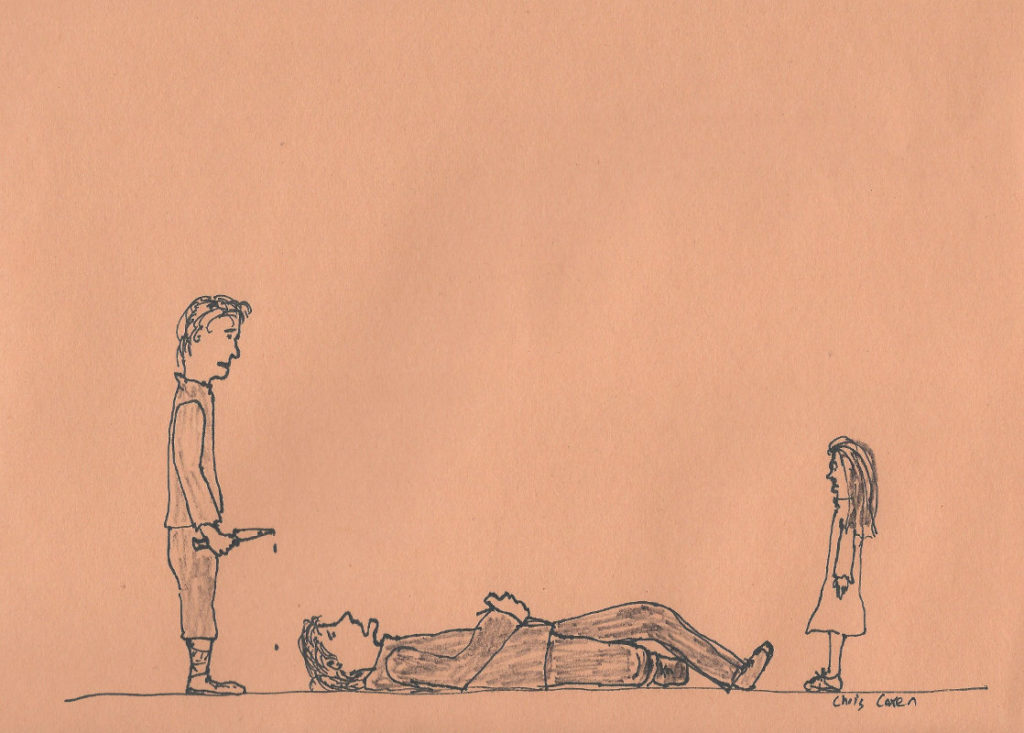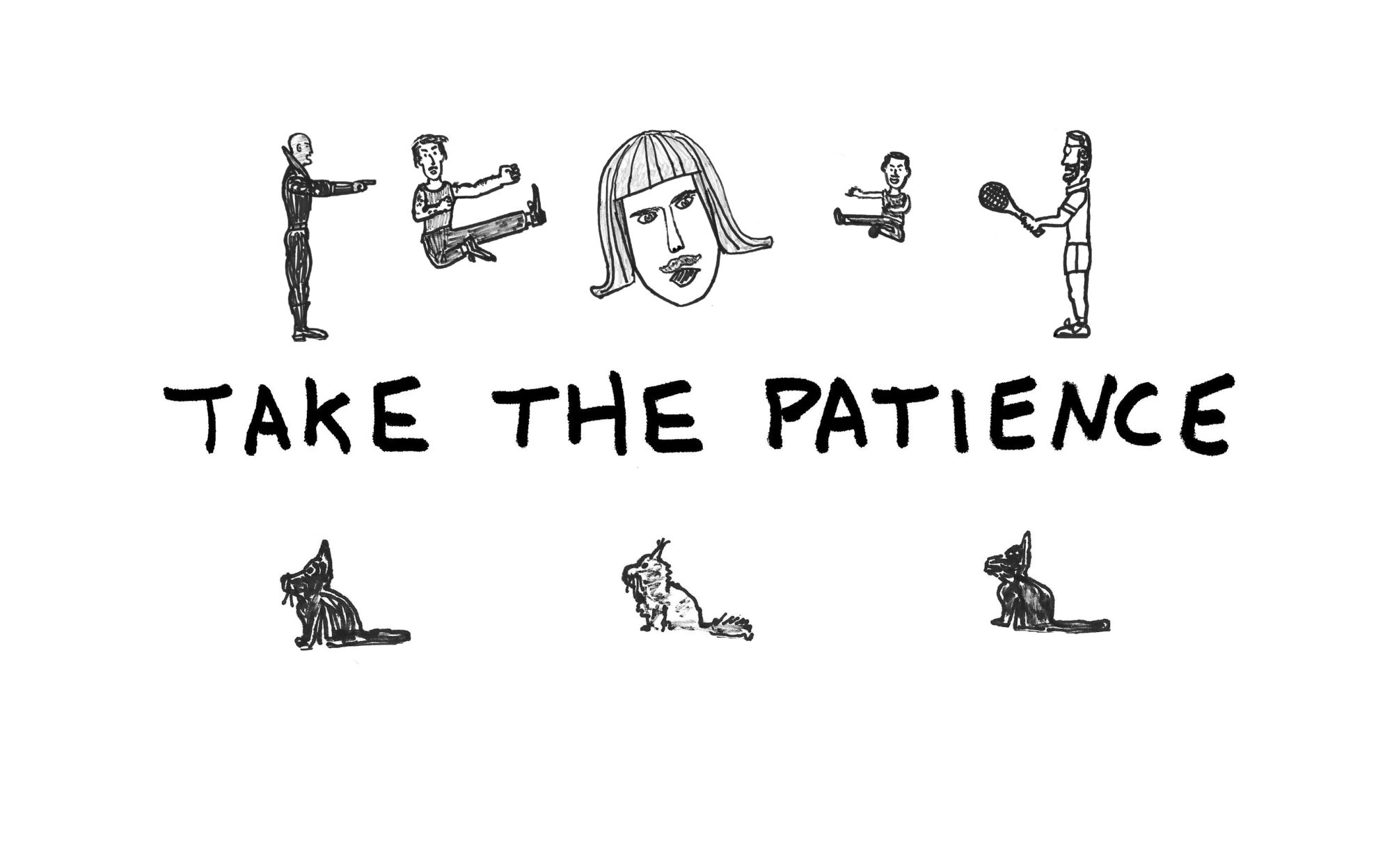December 11th, 2010
When I moved in, there was not much work to be done. I had been unknowingly getting the house ready for my arrival for the past five years. With that said, there was one major renovation that needed to be done – the disco kitchen. I began work on it a week after my arrival. When I pulled the refrigerator out, I noticed a letter with my name taped to the wall. I sat down at the table and read it.
Dear Chris,
We often don’t have the luxury of choosing how we die or the amount of time we have left once we know the end is near. If God gives me an encounter with you right before my time, then you’ll already know the contents of this letter.
By now you’ve taken over The Castle! Congratulations…and you’re welcome. I know you well enough to know you’re saying thank you right now but you don’t need to thank me. I need to thank you. As it turns out, you can’t take it with you. By “it”, I mean wealth and possessions. Sure, I could have given it to a distant relative or a charity but I’ve watched you closely for the years that I’ve known you and I can tell that you will end up being the best investment I’ve ever made.

I also know you well enough to know that you wouldn’t waste time in remodeling the kitchen. The ancient nature of the kitchen and my refusal to update it has caused many a grimace for you, I’m sure. Knowing this, I knew I had discovered the perfect hiding place for this letter.
Something else I’ve known about you is that you’ve wondered about the Nazi dagger. You’ve known there’s a great significance behind it but you could sense I didn’t want to discuss it so you tactfully left it alone. I would have rather told you the story behind it in person. I’m not sure why I didn’t tell you earlier. Perhaps it is because the lesson it holds should be the last lesson I give you. Delivering the lesson in this manner ensures it is the last lesson I give you.
During the late winter and early spring of 1945 in Germany, I was part of General Patton’s renowned 3rd Army. The pace at which we gobbled up enemy territory and soldiers was comparable of that to an out of control forest fire after a long drought. Although success seemed to come easily during this time, there was one mission that failed miserably. On the evening of March 26, under the command of Captain Abraham Baum, about 300 of us went 50 miles behind enemy lines. Our mission was to free the prisoners of Camp Hammelburg. At first, this sounds noble but we weren’t given enough men for the job. Our Lt. Colonel wanted his entire command to go but he was overruled. We also weren’t given enough maps. Along the way, we had to stop and ask the locals where to go! But the biggest kick in the proverbial pants was our reason for going. Although he never admitted it, General Patton’s biggest motivating factor for this mission was to free his son in law who was located in Camp Hammelburg. I’m guessing this was why he made this mission secret and didn’t tell Eisenhower about it. All of us were happy to free Allied troops. We just wanted to go about it in the right way and for the right reason. Even if we were undermanned and underequipped, most of us would have been happy to attempt the mission as long as it wasn’t for one man’s personal reasons. Over three hundred set out, thirty-two were killed and only thirty-five made it back. I was one of those 35 (eventually).
I have since made my peace with this event but at the time we were being ambushed by German troops in Höllrich, I was confused and angry and felt my life and the lives of my fellow soldiers were being wasted in an ill-planned mission. As we regrouped on a nearby hill, I thought how these poor prisoners we “rescued” would have been safer had they remained in the camp. Just after dawn on March 28th, we formed into a column and tried to head back. The German’s attacked us with brutal force, so much so that Captain Baum gave his last order of that mission: every man for himself.
Did I ever mention I was a good runner? I ran a 4:22 in the mile in college. I wish someone timed my retreat that day; I must have set at least an American record for the first mile. As fast as I went, I remember seeing death all around me. I recall seeing a fragile, ill, malnourished prisoner gunned down with no remorse as he attempted an escape. It was horrific. Never before that moment or after had I seen man in such a despicable, soulless, and evil form. Its impact on me was immediate.
I must have ran five miles deep into a forest before my body gave way to exhaustion and emotion. I kept seeing that prisoner being shot to his death as he tried to run. I think he was Serbian. He was wearing a gray uniform. He was probably my age but the harsh conditions he endured cruelly aged him. When we first arrived at the camp, we actually fired at the Serbian section, thinking they were German soldiers in their gray uniforms. What must have been going through this man’s mind as he died? Was he cursing the Americans for being a bigger threat to his life than the Germans? Was he thinking how if he stayed in the prison, he would have survived? Maybe he was glad it was over. The more I thought, the more I cried. The more I cried, the angrier I became. The sadness eventually left me but the anger did not which is unlike me. Anger typically leaves me before too long.
I sat against a tree for about an hour. At some point I looked down and realized I had no weapons or food or water on me. They must have fallen off during my retreat or perhaps I got rid of them as I ran to increase my speed; I can’t remember. I then heard the sound of twigs breaking somewhere behind me so I slowly peered around my tree and saw somebody about 30 yards away running perpendicularly to my position. I focused in on them and could see it was a German officer. He looked as tired if not more so than me. Judging by his direction, I don’t think he was running from my battle. My guess is that he was retreating from some other battle.
I don’t know why, but I felt compelled to follow him. With each step, my anger accelerated. I didn’t realize it at the time but this man was progressively becoming the answer to all the pain and frustration I had just endured over the past two days. He had a German uniform on. That was his sin. That was the only reason I needed to hunt him.
But one large problem prevailed. I had no weapon and he had at least a dagger and a pistol. I continued to follow him from a safe distance, stopping when he stopped, scavenging for berries and water when he did. I was not trained for such a maneuver as this. I didn’t know how to survive in the wild like this. Thankfully, my prey did and I mimicked his actions. It was ironic that the man I intended to kill was unknowingly keeping me alive. At one point, I noticed that this whole time I had been running in the opposite direction of the line I should have been trying to cross but I was obeying the call of a misplaced revenge, not logic. I was amazed with the amount of focus my anger provided me. It gave me patience. It gave me energy even though I did not sleep for three days. It told me the moment had to be just right for me to attack. His guard had to be let down. I thought that the first night would provide me an opportunity to take his life but it did not (neither did the second night). Even at night this man would not stop and sleep as I thought he would. He would rest a little but kept going. He avoided people. At first I wondered why. Can’t he walk up to any house and ask to spend the night? He’s in his own country. Then it dawned on me: he may be viewed as a deserter. But that still didn’t explain why he didn’t sleep. Why was he in such a hurry? Where was he going? The moment I had painfully been waiting for finally arrived. It was about two days after the chase began.
It was cool and sunny. I could see my breath but at the same time, it somehow felt like it was going to be a warm day. We must have moving east at that moment because the sun was low and almost blinding me. The woods we made our way through were about to end. From what I could tell, a field laid beyond them. This unknown enemy of mine stepped into the field and stopped. From behind, the sunlight surrounded his figure and made him look on fire and for the first time, powerful. He was doing something but I couldn’t tell what it was. As I moved closer, I could see he was clearly distracted by something he saw. Whatever he was looking at was down a slight hill and out of my view.

It appeared my moment had arrived. I was now closer to him than I had been in the past two days. I could now see details about him that I had not been able to before. There were several tears in his gray uniform and his black boots looked like an alligator mistook them for beef jerky. Dirt and grass stains covered him to the point it looked like he had rolled his way to this point. His uniform was beyond wrinkled, beyond crumpled. It looked like a newspaper that someone had crumpled up and sat on for a month. He perfectly paralleled the state of the German army at that point in time: once glorious and pristine but now reduced to a dirty frightened animal on the run.
I crept up to him closer. Thankfully there was a decent wind that blew some leaves around that masked any sound I made. I could see he had some sort of sheathed dagger on his left hip and a pistol on his right. I thought at such a moment I would pause or hesitate but I did not. My anger which had not abated in the slightest over the past two days kept me motivated and confident. More even, my anger allowed me to come up with a plan of attack in the time it took me to make my final ten-foot approach.
His left hand was up near his face. I couldn’t tell if he was waving at someone or shielding his eyes from the sun. From behind, I wrapped my arms around his waist, allowing my hands to join at his dagger on his left hip. With my left, I gripped the sheath of the dagger and with the right, I drew the blade out. I was now being blinded by the sun but it didn’t matter, I had the advantage and was doing everything by feel. By the time he started to react, my left hand was now travelling up to his throat while rendering his left arm useless, keeping it pinned up high. I grabbed his throat hard with my left hand which stunned him as I now sunk the dagger deep into his abdomen. I knew little of exactly where a lethal strike would be so once the blade was in, I moved it around a great deal. He still resisted but I could feel his strength diminishing. I said nothing and he said nothing. I took the knife out and stabbed him again in each lung. As his body slid down mine, I snatched the sheath and it ripped off his hip. I put the dagger back in the sheath and held it in my right hand.
I looked down the slight slope and now I could see what he was looking at: a young girl of about seven. She stood more still than any of the inanimate objects in my field of vision. She was about 40 feet away from me. I too now stood with absolutely no motion. Who was this girl? Her expression of blank shock did not lend me any clues. After some time, my victim’s hand moved slightly. The young girl looked at it and her face was now expressing confusion and a pain that not even the greatest actor could mimic. I looked down at my enemy who stopped moving and appeared to be dead.
I had killed a man who was simply trying to come home to his daughter.
I stepped back and tripped. My eyes filled with tears. I got back on my feet and between the sun and the tears, I could hardly tell where I was. I shut my eyes forcefully to try and remove some of the water. I ran away from the sun and the little girl.

After a mile of running, I stopped and finally noticed that I still had the dagger in my hand. It was strange that I didn’t simply throw it down. I carried it with me the rest of the way.
I eventually made it back to camp and to many smiling faces. When they asked where I had been, I told them I was lost. I told no one the truth. My fear was that I would have been congratulated for my efforts or worse, received some promotion or medal.
So why didn’t I dispose of the dagger in the woods? Why did it keep it among my other war memorabilia for the rest of my life?
To be honest, I don’t know why I held on to it on my way back in the woods. Some force overrode my mind and commanded me to hold onto it. After I returned from the war, I realized why I needed to continue holding onto this grotesque instrument.
As God’s “chosen” creatures, we have two very great powers. The first is to take and the other is to give. We need to take a little to survive but often greed and rage and all of their cousins cause us to take far beyond our needs. Suddenly, our desire to take becomes a destructive, cancerous force that will kill all around it and ultimately the host. To give, however, is to create. There are practically no limits to giving. To give is to exercise one of the most underrated traits of all time: humility. To be humble is to remove the focus from yourself and to become part of something greater than yourself. Ironically, the more you give and the less you concern yourself with yourself, the more powerful you become. Those that take try to fill an abyss that simply cannot be filled and sadly miss out on the greatest power of all: the beautiful power of not just belonging to something greater than themselves but becoming that very thing that is greater than themselves.
That day in Germany, I took. Some would say it was okay because it was during a war and I killed an enemy. Or it was a Nazi and all Nazis are evil and deserve death. There is no argument I encountered that made me feel at peace with taking that man’s life that day. Believe me, I’ve gone through all the possible arguments of why it would be okay to kill that man and none have brought me peace. What did bring me peace was using that terrible, dark moment as a motivating force to always do the opposite of what I did that day. When I looked at that knife, I no longer saw the evil forces of the Nazi movement or the life that it allowed me to take, I saw it as a reminder to give and create.
I do hope you don’t have to go through what I went through to learn about the beauty of giving. I hope this story is enough. Everything I have observed about you tells me you understand this vital lesson.
You can throw the knife away, if you want. It is pretty disturbing! Moreover, it has served its purpose.
Yours,
TAP
I put the letter down. I also put my tools down for the rest of the day. That was a big episode to digest. I started to walk towards James’s Gate in efforts to find something that would help me digest. It was time to medicate as I ruminate. As I waited for a hole in the traffic on Washington Street that would allow me to cross over, l realized that I was standing next to Doyle’s. Someone stopped their car to let me cross but I looked at Doyle’s, looked back at the courteous driver, waved the nicest “no thank you” I could muster, received a slightly annoyed look, and then headed into Doyle’s.
As I sat at the bar and sipped my stout, I read over parts of the letter again. Damn, that was intense. For some reason, my mind was able to form a picture of this little girl that I never met in my mind. Her hair was dark and long and parted on one side. It had a little wave to it. Her eyes were dark too. She was in a white sleeping gown but quickly threw on some shoes that she didn’t tie so she could run out to greet her father once she saw him. She ran out of her house and towards this man that she was overjoyed and relieved to see. “It was over”, she must have thought, “and now I no longer have to worry about my father.”
And then, unknowingly, Thomas Aloysius Pemberton stepped in and with one move that took a few seconds to execute, killed a man and probably ruined the life of an innocent girl (not to mention the rest of her family).
Perhaps this is why he never had children. I never asked why he didn’t have children and he never offered it up but I think it’s safe to say what the reason was. Knowing Mr. Pemberton, he most likely and sadly thought that he didn’t deserve to have children. A life alone would be his penance for this deed.
Elsa! The German lady from the funeral! That is the young girl Mr. Pemberton is referring to in his letter. It didn’t hit me until my third beer but when it did, I tried my best to recreate the moments from the funeral. I closed my eyes very hard, put my hand to my head and re-watched all the scenes from that day in my mind that involved Elsa. But why would she be at the funeral? It made no sense that Elsa was the one from the letter but I just knew it was. When I opened my eyes, the bartender was looking at me. I gave him a small wave to let him know I was alright. I chugged down the rest of my beer and left.
I needed an answer to Elsa’s presence right away. I called Frank Rosenberg.
“Hi Frank. This is Chris.”
“Chris! Great to hear from you! How are you making out with the house?”
“Great. Lots of work to be done but great. Um, Frank, I apologize if I’m sticking my nose where it doesn’t belong but why was Elsa at the funeral?”
Considering how great Frank was with words, the silence my question created was something to behold.
I continued, “I found Mr. Pemberton’s letter. He told me what happened in the war…about the German soldier and her daughter. I just can’t understand why…unless TAP somehow helped…”
I could tell Frank was smiling. “You know TAP well enough to know the kind of man he was. That kind of man would do everything in his power to repay such a large debt. TAP knew it could never be repaid but he decided to die trying and this is why Elsa was at the funeral.”
“But how has he been helping her?”
“Between you, me, and the wall…he sent her money.”
“That must have been an awkward process to initiate.”
“Well, Elsa thought the money was coming from some German military benefit thing that very few families qualified for. TAP spent a decent amount of time and money figuring out how to make it look legitimate, how to make it look like the German government was paying the surviving members of a family some sort of military life insurance that the fallen soldier had. He even paid some German shoe salesman he met in the war to pretend to be her dedicated account rep so if she had any questions about the payments, she would call the number on the letter, thinking she was calling some government employee when in fact she was talking to a guy that owned a shoe store in Munich.”
“Wow…and that worked?”
“It did for many years until she found out the truth. The shoe salesman died unexpectedly one day. Before the news even got to TAP, she happened to call the shoe salesman with a question, something she rarely did. A relative of the deceased picked up the phone and essentially told her the man she had been dealing with regarding her payments was a shoe salesman and not a government employee. Confused, she did a lot of digging and found out where the payments were coming from.”
“Did she call him? Was she angry?”
“She had no idea who Thomas Aloysius Pemberton was so she actually flew over with her husband to find out who the source of this mysterious money was. I remember the day she showed up to our office, looking for TAP. Their encounter was unlike anything I’ve ever seen or will again. Even though they saw each other for a few seconds, years before, it took them a fraction of a second to recognize each other that day in our office. Elsa literally collapsed and had to be reminded to breathe by her husband. The short of it is that they somehow became friends after all this. They had this unlikely, eerie bond that lasted through the years. It’s strange but the two of them coming together helped them both recover from an old psychological wound.”
“I don’t know what to say, Frank.”
“I’d be worried if you did know what to say after a tale like that.”
